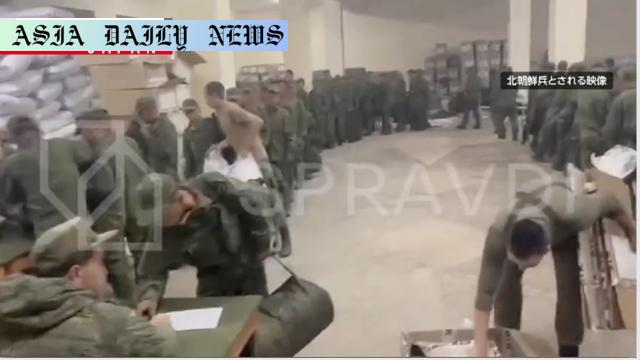North Korea tracks 64 trips by Russian ships transporting 4-6 million artillery shells from Rajin to Russian ports for war efforts.

North Korea’s Involvement in the Ukraine War: A Detailed Analysis
In a significant development with far-reaching geopolitical implications, a joint investigation conducted by Reuters and the Open Source Centre (OSC) has revealed North Korea’s prominent role in supplying artillery shells to Russia. Over a span of approximately 18 months, North Korea reportedly shipped between 4 to 6 million artillery shells to bolster Russia’s ongoing military offensive against Ukraine. This large-scale ammunition transfer underscores the depth of the military partnership between Pyongyang and Moscow, raising multiple questions about the broader consequences for global stability.
Tracking the Operation: A Logistics Breakdown
The investigation highlights the extensive coordination involved in the operation. The OSC tracked 64 voyages undertaken by Russian-flagged container ships between September 2023 and March 2025. These vessels made consistent trips from North Korea’s Rajin port to at least two Russian ports, including Vostochny, located in Russia’s Far East. Analysts estimate that these voyages transported nearly 16,000 containers of armament, supplying Russia with artillery and mortar shells to sustain its protracted military campaign against Ukraine.
Implications on the Ukraine Conflict
Analysts argue that North Korean artillery shells have had a profound impact on the dynamics of the Ukrainian battlefield. Reuters reviewed Russian military documents revealing that entire artillery units relied solely on North Korean munitions on specific days. This assistance is credited with enabling Russia to maintain an offensive stance throughout much of 2024 and well into 2025. North Korean munitions allowed Russian forces to apply constant pressure on Ukrainian troops while sustaining their firepower, intensifying the already precarious situation in the region.
Geostrategic Ramifications and Global Response
North Korea’s substantial support for Russia’s military objectives raises significant concerns for the global community. By actively aiding Moscow, Pyongyang is not only strengthening its bond with Russia but also demonstrating its opposition to the West. This growing military alignment between the two nations is likely to complicate international diplomatic efforts and lead to more pronounced divisions among world powers. Furthermore, these findings challenge existing sanctions and highlight weaknesses in their enforcement, as North Korea has evidently found ways to navigate around global restrictions.
Conclusion: A Call for Strategic Assessment
The revelations about North Korea’s involvement demand a strategic reassessment from the international community. This partnership between Moscow and Pyongyang has the potential to exacerbate global tensions and impact the trajectory of the Ukraine conflict. While North Korea’s reliance on its military exports for economic stability is well-documented, its overt support for Russia’s campaign against Ukraine adds a dangerous dimension to global geopolitics. The international response to these developments will play a pivotal role in shaping future regional and global dynamics, underscoring the urgent need for cohesive and effective diplomatic action.
Commentary
The Strategic Impact of Pyongyang’s Supply Chain
The report detailing North Korea’s significant contribution to Russia’s military campaign through artillery shells offers much food for thought. This revelation not only highlights the depth of military ties between North Korea and Russia but also underscores the complexities of the global arms trade, despite international sanctions. North Korea’s strategic decision to provide such pivotal support demonstrates its commitment to its alliance with Moscow as well as its defiance toward Western powers. The number of shells supplied—between 4 to 6 million—points to a monumental logistical undertaking, positioning Pyongyang as a major player in sustaining Russia’s military operations versus Ukraine.
A Geopolitical Domino Effect
This collaboration will undoubtedly have geopolitical ramifications, particularly for the West and its allies. With North Korea actively aiding Russia, the dynamics of global alliances are shifting, possibly heralding a new Cold War-like polarization. Such partnerships can embolden authoritarian regimes and raise tensions across multiple regions. For example, the focus may shift to how North Korea’s international actions influence ongoing relationships with China or Iran, which already face significant scrutiny for their stances on global conflict issues.
The Future of International Sanctions
Another critical consideration is the efficacy of current sanctions imposed by the United Nations and individual nations. The findings of North Korea’s role in Russia’s military campaign illustrate loopholes that need addressing. Enforcing stricter sanctions or revising existing mechanisms becomes ever-more crucial to stymying the flow of such military supplies, which only aggravate conflicts like the war in Ukraine. However, achieving these goals requires coordination and commitment from all major global powers, a task that might be stymied by competing political priorities and interests.
Conclusion: The Need for Cohesive Diplomacy
Ultimately, revelations like this emphasize the importance of diplomacy and international oversight in a world increasingly shaped by conflict and alliances of convenience. The Western response to this issue, as well as other emerging partnerships between nations deemed adversarial, will define the global order for years ahead. While sanctions and humanitarian appeals to peace remain vital, there must also be recognition of the complex layers of strategy and loyalty that motivate nations to act. True resolution lies in addressing the foundational causes of geopolitical strife.


